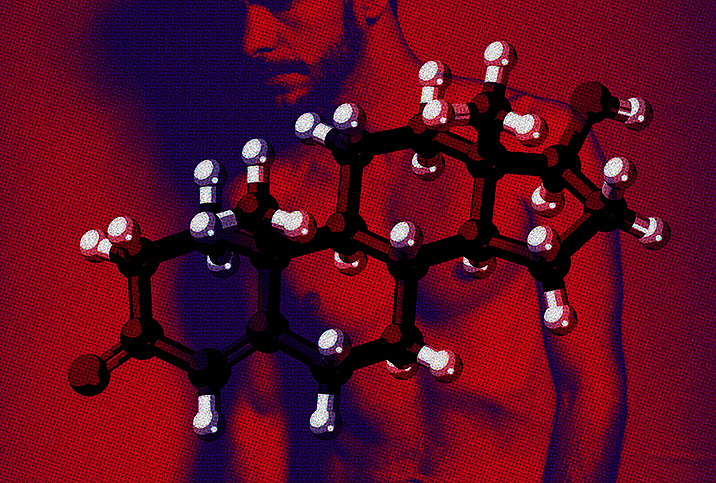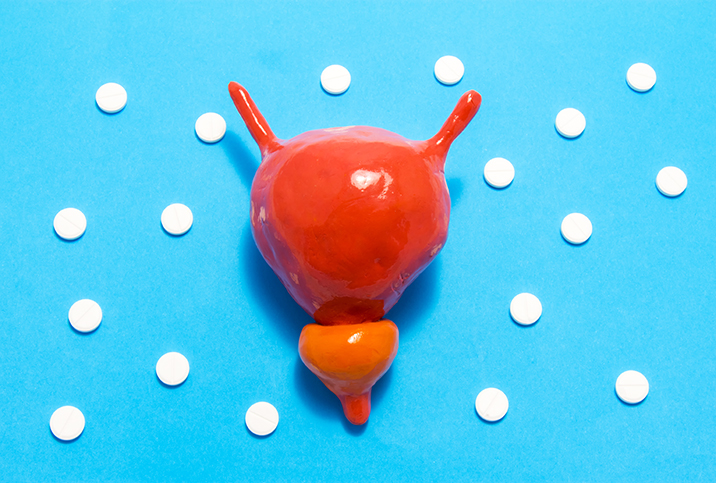New Drug Regenerates Erectile Nerves Damaged by Prostatectomy

Often in medicine, fixing one issue causes or contributes to another. But if the issue being fixed is dire, and the secondary issue is more inconvenient than drastic, patients may have to live with the resulting consequence—or team with their doctor to find a workaround.
One example of this situation is erectile dysfunction (ED) caused by radical prostatectomy, which is the most common treatment for localized prostate cancer. Yes, the prostatectomy might very well save your life, but your sexual exploits are likely to suffer. Get rid of prostate cancer and live, or cross your fingers and hope you survive it and keep your erection. The choice is pretty obvious, especially since ED isn't automatic after the surgery, though it is common—as high as a 90 percent rate, depending on the surgical approach and experience.
Researchers at Albert Einstein College of Medicine in New York are looking to make the choice easier.
ED isn't automatic after the surgery, though it is common—as high as a 90 percent rate, depending on the surgical approach and experience.
The Bronx-based scientists are working on a drug that could give men a solid chance of maintaining erectile function after a radical prostatectomy. How? By regenerating and restoring the function of erectile nerves damaged by the procedure.
"Despite the advent of so-called nerve-sparing procedures, the surgery can damage the cavernous nerves, which control erectile function by regulating blood flow to the penis," said study co-leader Kelvin P. Davies, Ph.D., professor of urology and of physiology and biophysics at Einstein, in a press release.
So far, the drug has only been tested on nerve damage in rats. Human trials are scheduled but are still a couple of years away. Researchers' hopes are high, though, because they say rats are reliable animal models in urologic research.
The mechanism
The new drug is a topical gel packed with small interfering RNA (siRNA) molecules that inhibit the gene that codes for an enzyme called fidgetin-like 2 (FL2). Basically, what happens during prostate cancer surgery is the cavernous nerves are either crushed or severed. When they try to repair themselves, FL2 steps in and puts the brakes on healing. Einstein researchers previously discovered FL2's interference—it stops skin cells from migrating toward wounds to heal them—during different research.
"We started by looking at the role of FL2 in cell migration and found that it is a general inhibitor of cell migration," said study co-leader David J. Sharp, Ph.D., professor of physiology and biophysics, of ophthalmology and visual sciences, and in the Dominick P. Purpura Department of Neuroscience, in an email.
Researchers know cell migration is central to tissue repair, so the Einstein team tested whether knocking down, or inhibiting, FL2 on a localized level could achieve various ends. Does it enhance skin healing? It does. Does it enhance corneal repair after chemical burns? It does. Does it aid recovery after a heart attack? It does. Does it lead to nerve regeneration in both the peripheral and central nervous systems? It does.
Trying siRNA
Given all of that, Davies and Sharp soon directed their clinical gaze toward injured nerves.
"FL2 is aberrantly overexpressed after injury, which includes surgical nerve damage, and this serves as a barrier to nerve regeneration, remyelination, revascularization, etc.," Sharp said. "So, by preventing that overexpression from happening, we can enhance all of these activities. All of these are central to the restoration of normal erectile function, which is what we see in our animal experiments."
To test the treatment, they mimicked crushed and severed nerves from surgery in rats and applied the siRNA gel immediately after the injury. In both kinds of injury—crushed and severed—the animals showed significant improvement compared to control groups. Seven of the eight rats in the severed group regenerated the nerves (none did in the control group), even when the gap between nerve ends measured several millimeters. According to Sharp, only nerve grafting had accomplished such outcomes previously.
In another bit of good news for men who may one day undergo a radical prostatectomy, rats who received siRNA gel following injuries had higher levels of nitric oxide compared to control rats. Since nitric oxide is vital to erectile function—and that applies even with the use of ED medications—more is better.
Okay, so what if this treatment isn't available at the time of someone's surgery? Do the researchers expect it can be used in the weeks and months following a procedure?
"Presently, our data indicate that FL2 knockdown can enhance erectile function when applied as surgery is being wrapped up," Sharp said. "We are now testing whether it can be used weeks after surgery, but those studies have not yet been completed. We know that FL2 is overexpressed for weeks, and perhaps years, after injury, so there is a reason to believe that therapeutic knockdown of FL2 could be useful for the treatment of chronic injuries…including prolonged ED after radical prostatectomy."


















